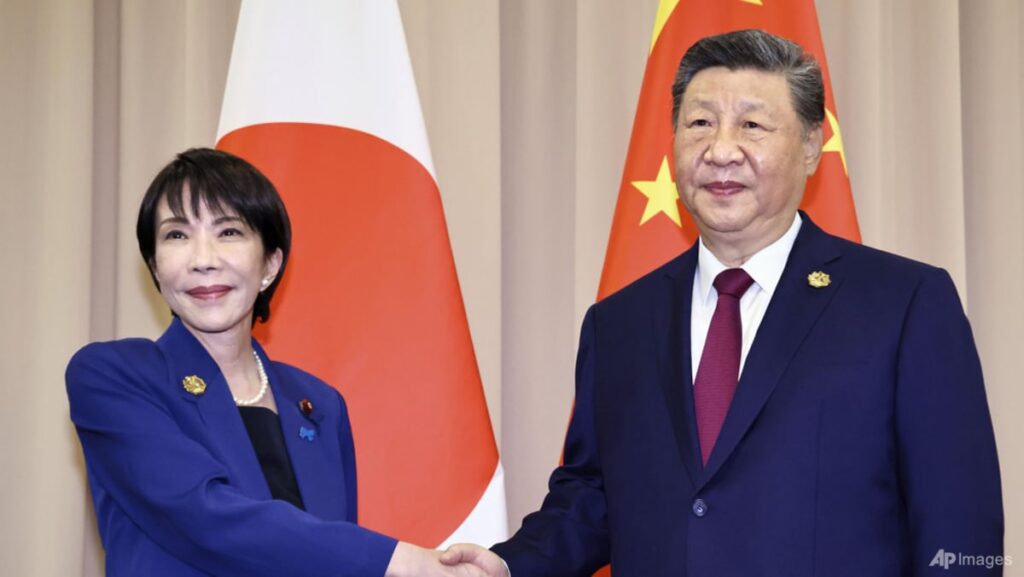SINGAPORE: A week after shaking hands with Chinese President Xi Jinping on the sidelines of the APEC Summit, Japanese Prime Minister Sanae Takaichi made comments in parliament that would spark a diplomatic row between the Asian giants.
She suggested that a Chinese attack on Taiwan could prompt a military response from Tokyo.
The remarks – and her refusal to withdraw them – have stoked anger in China, which lays claim to the self-governing island.
The diplomatic row has evolved from a war of words to Beijing advising its citizens against travelling and studying abroad in Japan.
Here’s how China-Japan relations soured rapidly in the past days – and what the potential consequences might be.
WHAT TAKAICHI SAID
During a Nov 7 parliamentary sitting, an opposition lawmaker asked about what could be deemed “a situation threatening Japan’s survival” – a legal term introduced in 2015 that allows Japan to deploy the country’s Self-Defence Forces.
Takaichi, seen as a China hawk, gave the example of a Chinese attack on Taiwan.
If an emergency in Taiwan entails “battleships and the use of force, then that could constitute a situation threatening the survival (of Japan), any way you slice it”, Takaichi said.
She later added that an attack on US warships sent to break any Chinese blockade on Taiwan could require Tokyo to intervene militarily to defend itself and its ally.
The Japanese prime minister later said her remarks were “hypothetical” and that she would refrain from making similar comments in parliament again.
However, the 64-year-old refused to retract her comments, stating that her remark was in line with the Japanese government’s position.
Japan recognises the “One China” policy. Following Takaichi’s comments, Chief Cabinet Secretary Minoru Kihara said that his government’s position on Taiwan remains unchanged, but it has done little to quell Chinese anger.
WAR OF WORDS
The Japanese prime minister’s comments in parliament drew swift rebuke from Chinese state media and officials.
On Nov 8, China’s Consul General in Osaka, Xue Jian, shared a news article on X and said: “The dirty neck that sticks itself in must be cut off.”
The post was later deleted, but not before Japanese officials raised their objections against the “extremely inappropriate” comments. Senior political figures in Tokyo called for Xue’s expulsion.
In an editorial on Nov 11, Chinese state broadcaster CCTV said Takaichi’s remarks were of “extremely malicious nature and impact” and have “crossed the line” with China.
As the spat dragged on, China’s foreign ministry spokesperson Lin Jian told a news conference on Nov 13 that Takaichi’s remarks were a “crude interference” in its internal affairs, resulting in a “heavy blow” to bilateral relations.
“Should Japan dare to intervene militarily in the Taiwan Strait situation, it will constitute an act of aggression, and China will strike back decisively,” he said.
This adds to his statement earlier in the week, calling Takaichi’s remarks on Taiwan “wrongful and dangerous”, and urging Tokyo to “take a hard look at its historical responsibilities”.
On Nov 14, China said it has summoned the Japanese ambassador.
Hours later, Japan said it summoned Beijing’s ambassador.
Read the full article here

